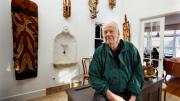Robert Gardner ’48, A.M. ’58, the noted anthropological filmmaker who founded the Harvard Film Study Center, has died of cardiac arrest at age 88, as The New York Times and The Boston Globe have reported. Gardner taught filmmaking in the department of visual and environmental studies for many years. He directed the Film Study Center from 1957 until 1997 and for decades remained a leader of the University’s filmmaking community. His wife, psychiatrist Adele Pressman ’68, announced Gardner’s death.
The Film Study Center grew out of early work that Gardner and others did at the intersection of anthropology and filmmaking in the 1950s. Among his landmark films are Dead Birds (1964), on the Dani people of New Guinea, who traditionally engage in ritual warfare and whom Gardner filmed during a 1961 expedition there, and Rivers of Sand (1974), which beautifully documents the society of the Hamer tribe of Ethiopia. Forest of Bliss (1986) explores life in the holy city of Benares, India, eschewing both narration and dialogue. Viewers cherished Gardner’s films for their anthropological interest, the beauty of their cinematography, and their storytelling skill. Harvard Magazine described Gardner’s anthropological filmmaking ventures in several stories, including a Harvard Portrait (1974), “Rivers of Sand” (1974), and “City of Light” (1986).









